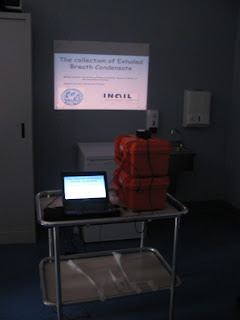I would like to share with you my experience and impressions about the School of European Respiratory Society in Italy: Monitoring of Airway Diseases, which took place in Veruno, Italy at 24 – 26 March 2011.
The main topic of the School was the very actual problem of the clinical respiratory medicine - Monitoring of Airway diseases. Under the guidance of a international faculty who are experts in their field all participants were provided with a critical overview of different modes of monitoring airway diseases and associated inflammation and oxidative stress in research and clinical practice.
The pathophysiological role of inflammation in lung diseases including asthma and chronic obstructive pulmonary disease is well established. Quantifying lung inflammation is relevant for the management of inflammatory airway diseases as it may indicate that pharmacological intervention is required before symptom onset and reduction in lung function. Moreover, monitoring of airway inflammation might be useful in the follow-up of patients with asthma and COPD, and for guiding pharmacological therapy. Quantification of pulmonary inflammation is currently based more on invasive methods including the analysis of broncho-alveolar lavage fluid, bronchoscopy, and bronchial biopsies, semi-invasive methods such as sputum induction, and the measurement of inflammatory biomarkers in plasma and urine, which are likely to reflect systemic rather than lung inflammation. Interest in the identification of non-invasive biomarkers for inflammatory airway diseases has been growing. Along these years less invasive methodologies have been introduced, such as induced sputum and the evaluation of various markers in exhaled air (NO, exhaled breath condensate, etc).
School of European Respiratory Society in Italy was organized by 3 well-known leaders of opinion in the field of biomarkers in respiratory diseases:
· Elisabeth Bel (Amsterdam, the Netherlands),
· Ildiko Horvath (Budapest, Hungary)
· and the host of the event Bruno Balbi (Veruno, Italy).
At the 1st Day of the School there were 2 sessions:
Session I – Current applications of traditional tests of disease monitoring
Session II – Information gained from induced sputum
Professor Bruno Balbi talked about Limitations of traditional tests, unanswered aspects of airway diseases.
Chair of ERS 2011 Amsterdam Congress, Elisabeth Bel presented Measurement of airway hyperresponsiveness. Co-chair of ERS 2011 Amsterdam Congress, professor Peter J. Sterk (Netherlands) made presentation about Applications of induced sputum sampling in asthma and Value of exhaled volatile organic compounds in monitoring airway disease.
2nd Day of the School: Session III New categories of patients, new methodologies.
I want to mention highly informative parallel sessions “How to do it” hands-on training: Airway hyperresponsiveness assessment, Sputum induction, Exhaled markers measurement and Exhaled breath condensate collection.
3rd Day of the School was dedicated to Session IV – Exhaled breath biomarkers.
2 Brilliant, exciting talks by Piter Barnes, Professor of Thoracic Medicine and Head of Airway Disease at the National Heart and Lung Institute and Honorary Consultant Physician at Royal Brompton Hospital, London were dedicated to Applications of exhaled and nasal NO in airway diseases and Markers of airway diseases in exhaled breath condensate.
As participants during and after course we:
- Recognize common and unusual findings in different methods used for monitoring of airway diseases both in adults and children.
- Correlate clinical presentation with results of traditional and newly developed methods of monitoring (i.e. lung function tests, exhaled breath measurements, induced sputum results).
- Better understand the relationship between the results of lung function tests, markers of airway inflammation/oxidative stress and severity of asthma and COPD.
- Gain knowledge on the diagnostic value and utility in diseases of the different monitoring techniques.
- Learn about the newest developments in the field of non-invasive assessment of airway inflammation and its potential effect on therapy.
The School of European Respiratory Society: Monitoring of Airway Diseases was a well attended meeting with participation of more than 50 pneumologists, pneumology trainees and research fellows from Sweden, Belgium, Israel, Norway, Moldova, Netherlands, Serbia, Bulgaria, Switzerland, Spain, Portugal, Italy, New Zeeland, Philippines, Latvia, Turkey, Albania, etc.
ERS Projects Coordinator Alexandre Delage and ERS Events assistant Laura Montangero provided good quality of organization of event and high education level corresponding to the standards of European Respiratory Society.
All presentations from this ERS School will be uploaded and available in a short time.
I would like to thank and congratulate European Respiratory Society and Organizing Committee for a successful School which allowed to taking part in different discussions and workshops, acquiring useful information and establishing relations with international specialists in the field.
Lake Maggiore













